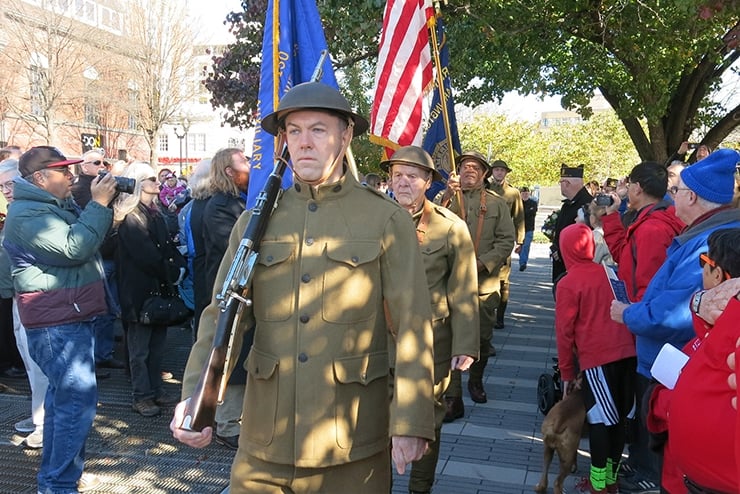At 11:00 on the morning of November 11, 1918, the Great War, which some at the time innocently called “The War to End All Wars,” came to an end. The guns fell silent, the murderous slaughter of soldiers and civilians ceased, and the survivors in the trenches and on the battlefields realized they would live to go home.
The very next year various countries began honoring this date and time—the 11th hour of the 11th day of the 11th month—as Armistice Day. In Great Britain, for example, Armistice Day evolved into Remembrance Day, a time set aside to recollect first the dead of the Great War, and later the dead of all wars fought by British forces. Britain observes a two-minute silence nationwide for those dead, and many honor the occasion by wearing poppies, real and artificial, to honor those who sacrificed their lives for their country, a custom inspired by the poem that begins “In Flanders fields the poppies blow/Between the crosses row on row.”
Here in the United States we already had an unofficial Memorial Day to honor the Union soldiers who had lost their lives in the Civil War. As a result, Armistice Day in the United States eventually became a time to honor all who had served their country in the armed forces. Veterans Day grants us the opportunity to pause and remember with gratitude those men and women who have kept the rest of us safe.
If we know such people, we should personally thank them. If not, we should keep our veterans and members currently serving in our military in our thoughts on this day. They deserve our appreciation.
We might also pause to remember the devastating effects of the Great War on the West and on the world. Now known as World War I, the war spawned a century of unprecedented conflict and violence, leaving several hundred million dead both from various wars and from Communist and Nazi governments who killed their own people.
The first glimpses of this new world order were seen when World War I helped bring the Communists to power in Russia, destroyed the Austrian empire, toppled European monarchies like so many dominos, and brought to the fore leaders like Adolph Hitler and Joseph Stalin. Soon totalitarians plunged the world into another even deadlier war.
Meanwhile, the Ottoman Empire collapsed, and the Treaty of Versailles laid out maps and plans for the Middle East that partly account for the decades of continuing conflict in that region.
The United States, which emerged from the Great War as the most powerful country in the world, has fought war after war since 1918: World War II, the Cold War, Korea, Vietnam, many “police actions,” and for thirty years now the wars in the Middle East. Our politicians have made many mistakes in strategy and foreign policy, and will undoubtedly continue to do so. They bear the blame for our defeat in Vietnam, for instance, and for our ongoing and seemingly endless presence in countries like Afghanistan and Iraq.
When we celebrate Veterans Day this year, let us remember these wars and the men and women of our military, living and dead, who have valiantly fought against our enemies and in fact are still fighting them. For a century now they have protected our shores and our people, obedient to the government and willing to do their duty.
When we see the American flag this Veterans Day, we should recollect those young warriors who fought out of pure motives to preserve our republic, our way of life, and the American Dream. Let these men and women who defended our country inspire in the rest of us the will to do the same in our present election crisis—not with arms, but with truth, justice, and love for America.
With those powerful weapons, let’s lock and load, and stand our ground.
Image Credit:
[Image from Flickr-Arlington County, CC BY-SA 2.0 , cropped and resized]

Leave a Reply